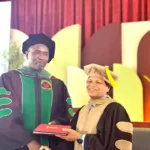Nelson Chamisa, the founding leader of the Citizens Coalition for Change (CCC), is once again at the forefront of Zimbabwean politics. After a period of relative quiet, during which he shared Bible verses and motivational content on social media, Chamisa is now directly challenging President Emmerson Mnangagwa’s government and its controversial policies.
Chamisa’s return to the political arena comes after he dramatically quit the CCC last year, claiming the party had been taken over by Zanu PF. Despite his renewed engagement, the 47-year-old opposition leader remains tight-lipped about whether he intends to form a new political party.
Sources close to Chamisa have indicated that his recent messaging is deliberate and calculated. There had been growing concerns that his avoidance of contentious political issues was lending credence to the narrative that he had been compromised by the Mnangagwa regime.
Last week, Chamisa joined a chorus of voices criticising the government’s new law requiring motorists to purchase radio licences before renewing their vehicle licences. He described the law as “too draconian, anti-citizens and outrightly heartless.”
Taking to X, where he commands a following of 1.3 million, Chamisa questioned the rationale behind the policy. “Citizens are being pauperised left, right and centre,” he wrote. “Why does the citizenry of this country deserve so uncaring and heartless a leadership? What are people supposed to do with all this cruel taxation? Why must I pay for a service I don’t use? Why should I pay for partisan propaganda, where I am attacked in person and demonised from dawn to dusk? Do we have a parliament in Zimbabwe? Which other country does this to her citizens? Is this not naked provocation? Is Zimbabwe not a crime scene?”
“Let’s be clear: the real crisis in Zimbabwe’s media sector is not a lack of policy, but the continued criminalisation of journalism,” Chamisa posted on X. “No amount of lipstick will beautify a frog. Instead of opening space for investment and innovation, this policy tightens the administration’s grip on the media.”
Chamisa went on to say that genuine reform would entail dismantling the existing monopoly, rather than reinforcing it, and promoting local investment instead of stifling it. He added that a real media policy would empower journalists, rather than threatening them with deregistration under vague “rules and standards” designed to suppress dissent. He also argued that it would promote self-regulation, as is the case in other respected professions, and transform ZBC and Zimpapers into genuine public service platforms, rather than echo chambers of outdated propaganda.
“When Chamisa went on the sabbatical he made it clear that he was not leaving politics, but CCC as a vehicle for change,” the source explained. “The reason we have been concentrating on building structures at the grassroots is because the splits that have rocked the democratic movement in the past is that they happened at the top while the base has remained intact and we want to change that.”
Chamisa has twice lost elections to Mnangagwa in controversial circumstances. He refused to concede defeat in both the 2018 and 2023 presidential elections, alleging widespread vote fraud.
Despite numerous attempts to solicit his comments on his future political plans, Chamisa remained unavailable for comment. His resurgence in the political sphere, however, signals a renewed challenge to Mnangagwa’s government and a potential shift in the Zimbabwean political landscape.

Follow @MyZimbabweNews












